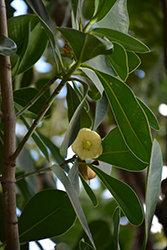It's all about ...
plants

Height: 15 feet
Spread: 15 feet
Sunlight:
![]()
![]()
Hardiness Zone: 10a
Other Names: Autograph Tree, Scotch Attorney, Clusia alba
Description:
A large shrub or small tree with a densely foliated crown; dark green leaves with lighter undersides; cymes of greenish yellow flowers primarily in summer; drought tolerant once established; grows rapidly in moist soils; tolerant of seaside wind and spray
Ornamental Features
Balsam Apple features dainty cymes of chartreuse cup-shaped flowers with creamy white overtones at the ends of the branches from early to late summer. Its attractive oval leaves remain grayish green in colour with curious olive green undersides and tinges of chartreuse throughout the year. It produces light green capsules with creamy white blush from early fall to mid winter, which fade to black over time. The fruit can be messy if allowed to drop on the lawn or walkways, and may require occasional clean-up.
Landscape Attributes
Balsam Apple is a multi-stemmed evergreen perennial with an upright spreading habit of growth. Its medium texture blends into the garden, but can always be balanced by a couple of finer or coarser plants for an effective composition.
This plant will require occasional maintenance and upkeep, and should only be pruned after flowering to avoid removing any of the current season's flowers. It is a good choice for attracting birds to your yard. It has no significant negative characteristics.
Balsam Apple is recommended for the following landscape applications;
- Accent
- Mass Planting
- Hedges/Screening
- Windbreaks and Shelterbelts
- Naturalizing And Woodland Gardens
- Container Planting
Planting & Growing
Balsam Apple will grow to be about 15 feet tall at maturity, with a spread of 15 feet. It has a low canopy with a typical clearance of 3 feet from the ground. Although it is technically a woody plant, this fast-growing plant can be expected to behave as a perennial in our climate if planted outdoors over the winter, usually regrowing from its base (crown) the following year. As such, gardeners should take into consideration that it will perform differently than it would in its native habitat.
This plant does best in full sun to partial shade. It is very adaptable to both dry and moist growing conditions, but will not tolerate any standing water. It is considered to be drought-tolerant, and thus makes an ideal choice for a low-water garden or xeriscape application. This plant will benefit from an application of bonemeal and/or mycorrhizal fertilizer at the time of planting. It is not particular as to soil pH, but grows best in sandy soils, and is able to handle environmental salt. It is somewhat tolerant of urban pollution. This species is not originally from North America, and parts of it are known to be toxic to humans and animals, so care should be exercised in planting it around children and pets.
Balsam Apple is a fine choice for the garden, but it is also a good selection for planting in outdoor pots and containers. Its large size and upright habit of growth lend it for use as a solitary accent, or in a composition surrounded by smaller plants around the base and those that spill over the edges. It is even sizeable enough that it can be grown alone in a suitable container. Note that when growing plants in outdoor containers and baskets, they may require more frequent waterings than they would in the yard or garden. Be aware that in our climate, most plants cannot be expected to survive the winter if left in containers outdoors, and this plant is no exception. Contact our experts for more information on how to protect it over the winter months.
This plant is not reliably hardy in our region, and certain restrictions may apply; contact the store for more information.
